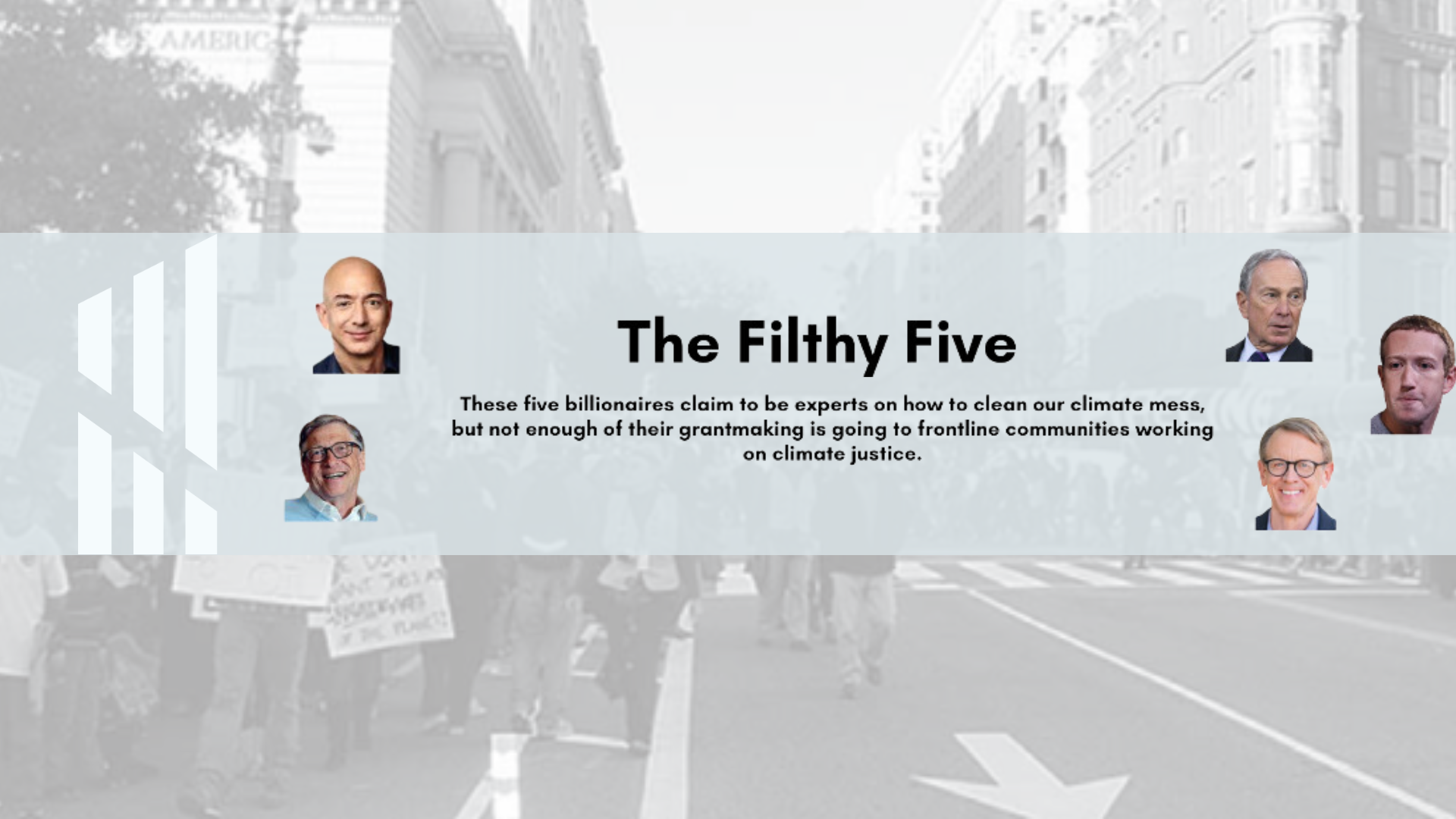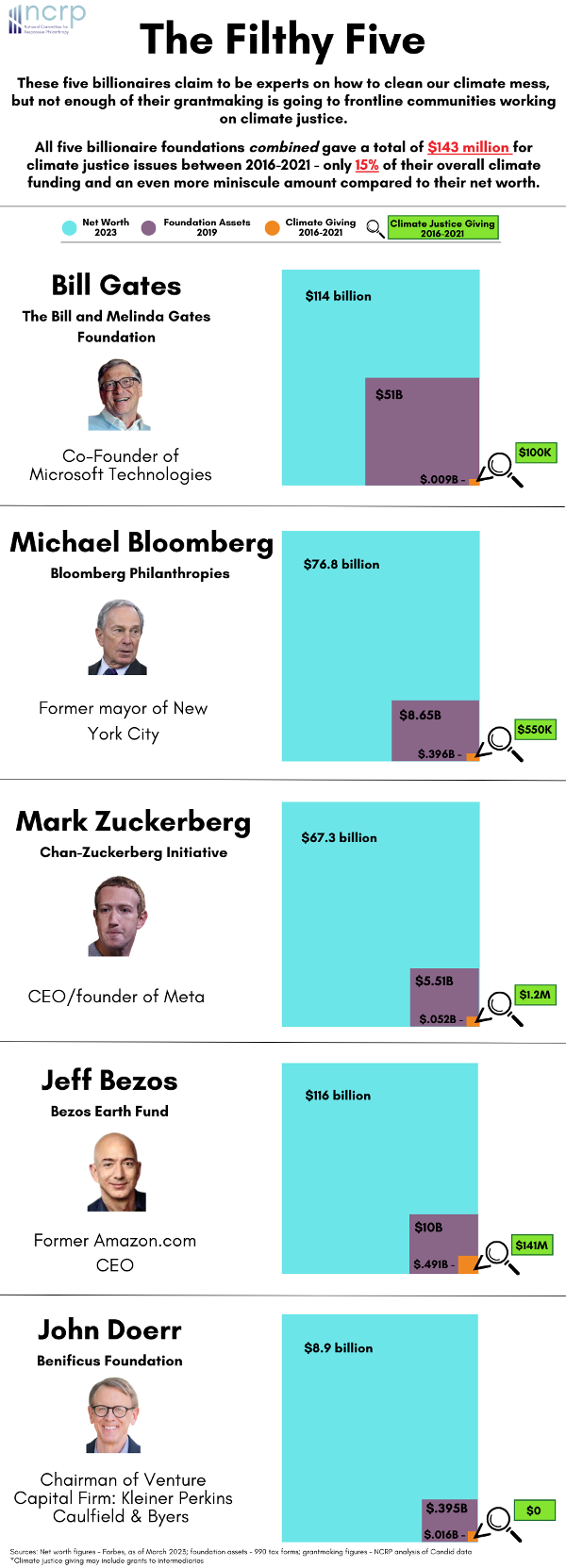Fifty-three years ago, on April 22nd, 1970, the first official Earth Day was observed. Twenty million Americans took to the streets in a collective effort to bring attention to decades of industrial development, polluted waterways, oil spills, expansion of highways and wildlife extinction.
The significance of this day has changed a lot since then. Collective action has shifted to individual responsibility, and even further to billionaire saviorism. But as the planet continues to heat up, the calls to action have only grown stronger.
Not everyone will feel the effects of this crisis equally. Frontline communities, those living on the frontlines of this crisis who are people of color, and economically disenfranchised will suffer disproportionately. Those with resources can and will adapt. The greatest wealth hoarding offenders, billionaires, are actively pushing out false narratives that they have the solutions that will bring us all with them to their dystopian paradise.
There is no way to sugar coat it. The urgency of this crisis is real and very present in the devastating effects it has on peoples’ lives.
Demystifying Billionaire Funding
The climate crisis can feel insurmountable on top of all the other concurrent crises that we as a nation are navigating – racial, economic, gender, anti-LGBTQ, anti-democracy, and housing to name a few. However, all these crises are connected and a result of our exploitive, profit-driven system. It is this same system that allows billionaires to hoard wealth and power at the expense of those on the frontlines of these interconnected crises.
As most of us worry about surviving these crises, too many self-absorbed billionaires are rushing to play the hero, using their wealth to position themselves as “experts” on any number of angles to the debate. Few are embarrassed by their overpromises that open markets and technological innovation will solve all our climate-related problems. Ironically, the business and philanthropic investments of many of these billionaires often play a very active role in the worsening of these issues. Many are largely interested in “solutions” that are either their own or aligned with their worldview. Worse yet, those preferences often come with extensive personal benefits and profit margins.
So how little are these billionaires giving to frontline communities and movement builders? Let us look at five billionaires who have platformed themselves as experts on solving this crisis, their net worth, and how much they give to the frontlines:
Despite their individual role in contributing to the climate crisis, each of these billionaires spend a tiny fraction of their own money on addressing the issue. An even smaller percentage of the money given to combatting the crisis even goes to climate justice groups.
Frontline Communities, Not Billionaires, Should Be Guiding Funders
The truth is that no amount of positive press or stated best intentions eliminates the fact that many billionaires in the climate funding space actively benefit from the same extractive system that their efforts claim to fight against. The wealth that they hold has been extracted from the same communities on the frontlines of the climate crisis that depend on their philanthropy to survive. Their “expert” status has less to do with solving the climate crisis than it does with exerting power and control.
If Bill Gates, John Doerr, Mark Zuckerberg, Jeff Bezos and Michael Bloomberg wanted to have an active hand in mitigating this crisis, they would stop the exploitative practices that have generated much of their stolen wealth. If these billionaires wanted to reduce emissions and rebuild disinvested communities, they would step back and defer their savior status and decision-making power to those on the frontlines who have always had the practical knowledge and expertise to meet this challenge. Why do those who have harmed frontline communities get to decide how those communities heal?
There is no quick fix that is going to solve this crisis, only frontline community power. Remember, to make the greatest impact, we need to take collective action to hold billionaires and the system they benefit from accountable. That may seem daunting, but here are some ways you can help:
If you are a funder who is actively funding frontline organizations, great! Continue to fund these organizations through multi-year general operating support grants with flexible grant reporting cycles. Get to know the organizations doing the work on the ground. The Climate Justice Alliance is a frontline member led alliance with over 80 member organizations who also has a funder resources page (linked above) and is a great place to start. Other organizations such as the Regenerative Economies Organizing Collaborative and Edge Funders Alliance are working with funders and frontline organizations together to move more resources directly to those most directly impacted and have resources for funders on their websites.
If you are a funder who is unsure where to start, there are philanthropic service organizations and funder networks such as Justice Funders, Neighborhood Funders Group, and the Environmental Grantmakers Association that provide learning spaces for funders who are looking to intentionally fund climate and environmental justice.
If you are not a funder, but want to act, here is a list by region of Climate Justice Alliance’s member organizations and their websites. Get involved on the ground through local events or donate to the organizations directly. Other regionally focused frontline climate justice focused alliances include, Alliance for Appalachia in London, KY; the California Environmental Justice Alliance; New York City Environmental Justice Alliance; and the Oregon Just Transition Alliance to name a few.
Taking effective action against the climate crisis is possible and it is already happening. To fight back against billionaires who are capitalizing on the saviorism narrative, we need a philosophical and material shift in the ways we think about who deserves to control the money. This Earth Day, let us stand together in solidarity with and center those most directly impacted by this crisis. Collectively, we can take back our power.
____________________________________________________________________________________________________________________________________________________________________
Senowa Mize-Fox is the Senior Movement Engagement Associate for Climate Justice at NCRP. Additional research and editing by Spencer Ozer, Stephanie Peng and Jennifer Amuzie.
For 4 of the billionaire foundations’ grantmaking data (Bezos Earth Fund, Bill and Melinda Gates Foundation, Bloomberg Philanthropies, and The Benificus Foundation), NCRP derived foundation funding figures for climate giving and climate justice giving through analysis of grantmaking data from Candid, starting with grants that were coded with the following subject codes related to climate or environment:
Climate change
Environment
Environmental justice
Environmental and resource rights
Coral reefs
Oceans and coastal waters
Natural resources
Energy efficiency
Energy resources
Grants that were tagged with one or more of these codes were included in the general climate grantmaking figure. NCRP then added additional coding to any of the climate grants that included a justice lens either in the grant description or at the recipient level to organizations that work primarily on climate justice issues.
Climate justice work includes the systemic inequities present in the scale and intensity of the effects of climate change and centers humans in the narrative with the various intersections of racial, economic, migrant, gender justice and more.Grantmaking data for the Chan Zuckerberg Initiative were sourced from their website, and the same additional coding for climate justice was applied to those grants.Net worth figures are from Forbes real time billionaires list accessed in March 2023. Foundation asset figures are from foundation 990 tax forms.























































































































































































































































































































































































































Leave a Reply